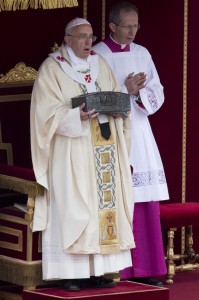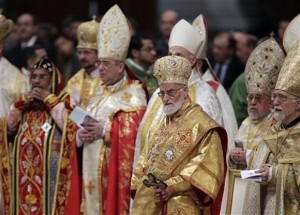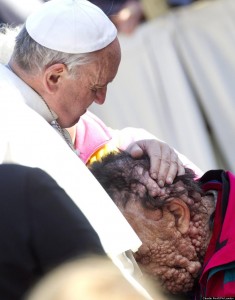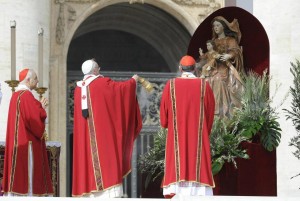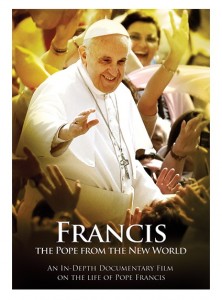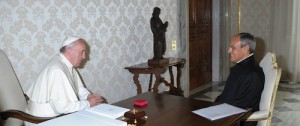For decades there has been an exchange of greetings between the Pope and the Archbishop of Constantinople. This is what you may say is a traditional expectation between brothers. Rome sends a message through a delegation on the feast of Saint Andrew (today) and the Orthodox do the same on the feast of Saints Peter and Paul (June 29). This year, the feast of Saint Andrew is the first time Pope Francis is able to write to Bartholomew. You’ll note that Pope Francis is keen on working for improved fraternal relations with the Church in Constantinople. Here is a Vatican Radio report.
To His Holiness Bartholomaios I
Archbishop of Constantinople
Ecumenical Patriarch
“Peace be to the brothers, and love with faith,
from God the Father and the Lord Jesus Christ.” (Eph 6:23)
 After welcoming with joy the delegation which Your Holiness sent to Rome for the feast of Saints Peter and Paul, it is with the same joy that I convey, through this message entrusted to Cardinal Kurt Koch, President of the Pontifical Council for Promoting Christian Unity, my spiritual closeness on the feast of Saint Andrew, Peter’s brother and the patron saint of the Ecumenical Patriarchate. With the heartfelt affection reserved for beloved brothers, I offer my prayerful best wishes to Your Holiness, to the members of the Holy Synod, to the clergy, monks and all the faithful, and – together with my Catholic brothers and sisters – join your own prayer on this festive occasion.
After welcoming with joy the delegation which Your Holiness sent to Rome for the feast of Saints Peter and Paul, it is with the same joy that I convey, through this message entrusted to Cardinal Kurt Koch, President of the Pontifical Council for Promoting Christian Unity, my spiritual closeness on the feast of Saint Andrew, Peter’s brother and the patron saint of the Ecumenical Patriarchate. With the heartfelt affection reserved for beloved brothers, I offer my prayerful best wishes to Your Holiness, to the members of the Holy Synod, to the clergy, monks and all the faithful, and – together with my Catholic brothers and sisters – join your own prayer on this festive occasion.
Your Holiness, beloved brother in Christ, this is the first time that I address you on the occasion of the feast of the Apostle Andrew, the first-called. I take this opportunity to assure you of my intention to pursue fraternal relations between the Church of Rome and the Ecumenical Patriarchate. It is for me a source of great reassurance to reflect on the depth and the authenticity of our existing bonds, the fruit of a grace-filled journey along which the Lord has guided our Churches since the historic encounter in Jerusalem between Pope Paul VI and Patriarch Athenagoras, the fiftieth anniversary of which we will celebrate shortly. God, the source of all peace and love, has taught us throughout these years to regard one another as members of the same family. For indeed we have one Lord and one Saviour. We belong to him through the gift of the good news of salvation transmitted by the apostles, through the one baptism in the name of the Holy Trinity, and through the holy ministry. United in Christ, therefore, we already experience the joy of authentic brothers in Christ, while yet fully aware of not having reached the goal of full communion. In anticipation of the day in which we will finally take part together in the Eucharistic feast, Christians are duty-bound to prepare to receive this gift of God through prayer, inner conversion, renewal of life and fraternal dialogue.
Our joy in celebrating the feast of the Apostle Andrew must not make us turn our gaze from the dramatic situation of the many people who are suffering due to violence and war, hunger, poverty and grave natural disasters. I am aware that you are deeply concerned for the situation of Christians in the Middle East and for their right to remain in their homelands. Dialogue, pardon and reconciliation are the only possible means to achieve the resolution of conflict. Let us be unceasing in our prayer to the all-powerful and merciful God for peace in this region, and let us continue to work for reconciliation and the just recognition of peoples’ rights.
Your Holiness, the memory of the martyrdom of the apostle Saint Andrew also makes us think of the many Christians of all the Churches and Ecclesial Communities who in many parts of the world experience discrimination and at times pay with their own blood the price of their profession of faith. We are presently marking the 1700th anniversary of Constantine’s Edict, which put an end to religious persecution in the Roman Empire in both East and West, and opened new channels for the dissemination of the Gospel. Today, as then, Christians of East and West must give common witness so that, strengthened by the Spirit of the risen Christ, they may disseminate the message of salvation to the entire world. There is likewise an urgent need for effective and committed cooperation among Christians in order to safeguard everywhere the right to express publicly one’s faith and to be treated fairly when promoting the contribution which Christianity continues to offer to contemporary society and culture.
It is with sentiments of profound esteem and warm friendship in Christ that I invoke abundant blessings on Your Holiness and on all the faithful of the Ecumenical Patriarchate, asking the intercession of the Virgin Mother of God and of the holy apostles and martyrs Peter and Andrew. With the same sentiments I renew my best wishes and exchange with you a fraternal embrace of peace.
